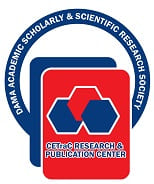Review Process
Peer review is the major quality keep measure for any academic journal. In this process, experts in the relevant fields, analyze the scholarly work from every perception, including its writing, the accuracy of its technical content, its documentation, and its impact on and implication to the discipline.
Reviewers play a pivotal role in scholarly publishing, and their valuable opinions certify the quality of the article under thoughtfulness. Peer review helps to approve research, establishing a standard for evaluation within research communities. Further, standard review process shall take 7 – 10 days’ time.
Dama Academic Scholarly and Scientific Research Society employ the peer review process in order to maintain academic standards and insure the validity of individual works submitted for publication. In addition, follows a single-blinded peer review process, to ensure independent editorial decision-making.
Publication Decisions: The editor of a peer-reviewed journal is responsible for deciding which of the articles submitted to the journal should be published, often working in conjunction with the relevant society (for society-owned or sponsored journals). The validation of the work in question and its importance to researchers and readers must always drive such decisions. The editor may be guided by the policies of the journal’s editorial board and constrained by such legal requirements as shall then be in force regarding libel, copyright infringement and plagiarism. The editor may confer with other editors or reviewers (or society officers) in making this decision.
Fair play: An editor should evaluate manuscripts for their intellectual content without regard to race, gender, sexual orientation, religious belief, ethnic origin, citizenship, or political philosophy of the authors.
Confidentiality: Editor and any editorial staff must not disclose any information about a submitted manuscript to anyone other than the corresponding author, reviewers, potential reviewers, other editorial advisers, and the publisher, as appropriate.
Disclosure and Conflicts of Interest: Unpublished materials disclosed in a submitted manuscript must not be used in an editor’s own research without the express written consent of the author. Privileged information or ideas obtained through peer review must be kept confidential and not used for personal advantage. Editors should reuse themselves (i.e. should ask a co-editor, associate editor or other member of the editorial board instead to review and consider) from considering manuscripts in which they have conflicts of interest resulting from competitive, collaborative, or other relationships or connections with any of the authors, companies, or (possibly) institutions connected to the papers. Editors should require all contributors to disclose relevant competing interests and publish corrections if competing interests are revealed after publication. If needed, other appropriate action should be taken, such as the publication of a retraction or expression of concern. It should be ensured that the peer-review process for sponsored supplements is the same as that used for the main journal. Items in sponsored supplements should be accepted solely on the basis of academic merit and interest to readers and not be influenced by commercial considerations. Non-peer reviewed sections of their journal should be clearly identified.
Involvement and Cooperation in Investigations: An editor should take reasonably responsive measures when ethical complaints have been presented concerning a submitted manuscript or published paper, in conjunction with the publisher (or society). Such measures will generally include contacting the author of the manuscript or paper and giving due consideration of the respective complaint or claims made, but may also include further communications to the relevant institutions and research bodies, and if the complaint is upheld, the publication of a correction, retraction, expression of concern, or other note, as may be relevant even if it is discovered years after publication.
Dama Academic Scholarly & Scientific Research Society
Tippa Junction, Same Building with Ga Rural Bank Ltd, Kwabenya, Accra – Ghana (West Africa)
www.damaacademia.com | email: editor@damaacademia.com
Home | About Us | Mission | Vision | Submission Forms |DASSRS Stand For
